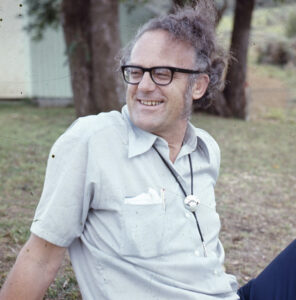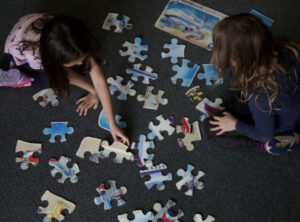By Vince Ford
In a remote school in Northland a principal was doing things very differently. In this school, te reo Māori was used in interactions with pupils, kaumātua were regularly invited to address the students and ākonga worked on real problems drawn from their local community. The community and the natural environment were incorporated into everyday learning and teaching and there was a strong focus on language, art and craft. “I felt my children were needing to express themselves about their own lives, their own homes, their own muddy tracks that led through the hills, their own fishing spots.”
Children were taught to look closely at the world around them, to observe and record their observations, to utilise scientific method and to integrate art and science into their everyday learning.
The startling thing was that Elwyn Richardson was principal of Ōruaiti School between 1949 and 1961, at a time when the use of te reo Māori was actively discouraged. The curriculum was prescribed down to what animal and bird were to be studied at what year level in the curriculum. Richardson refused to allow the education of Ōruaiti pupils to be confined in that way. He also stood against corporal punishment in schools and was labelled an ‘educational saboteur’ by James K Baxter.
With the blessing of Clarence Beeby the Director of Education, Ōruaiti became an experimental school, Richardson set aside the official syllabus and turned to the lives of the students and their environment as the foundation for his school curriculum.
Richardson later went on to be principal of Hay Park and Lincoln Heights schools in Auckland, he lectured internationally and wrote about his thoughts on curriculum. He was made a Companion of the Queens Service Order for his work in education and received an honorary doctorate in literature from Massey University.
Its interesting to reflect on Elwyn Richardson’s work when Te Mātaiaho, the curriculum refresh has been placed on hold. As well as understanding and valuing Te Tiriti O Waitangi, the principles of Te Mātaiaho are to hold a broad view of akōnga (student) success and to hold high expectations for all ākonga (students).
Within the principle of holding a broad view of success, Te Mātaiaho places wellbeing and excellence as important and connected. It reinforces inclusion through a focus on positive, inclusive relationships, a sense of belonging for all, and a promotion of diversity as ordinary and expected.
In describing Te Mātaiaho, Graham Hinengaroa Smith said that it was about ‘seeking ways to bring people together and to be more focused on what holds us together rather that what divides us.’
To me, this principle is about seeing every student for who they are, truly listening to them and valuing what they bring with them in terms of their culture, their experience and the people they share their lives with. It is about forming a relationship so that every child can feel safe and extend their trust to the kaiako and the class.
I believe this is the work that Elwyn Richardson was pursuing in Northland. When he began this work, he did it despite the dictates of the Education Department. Later, he came to influence a generation of teachers. I believe that his example demonstrates the influence a teacher can have on students lives when they forge deep and meaningful connections with the students themselves. Whether the curriculum refresh is on hold or not, isn’t this the work that educators and leaders in education should be undertaking?
Elwyn Richardson – Oruaiti Prinipal from 1941 – 1961

